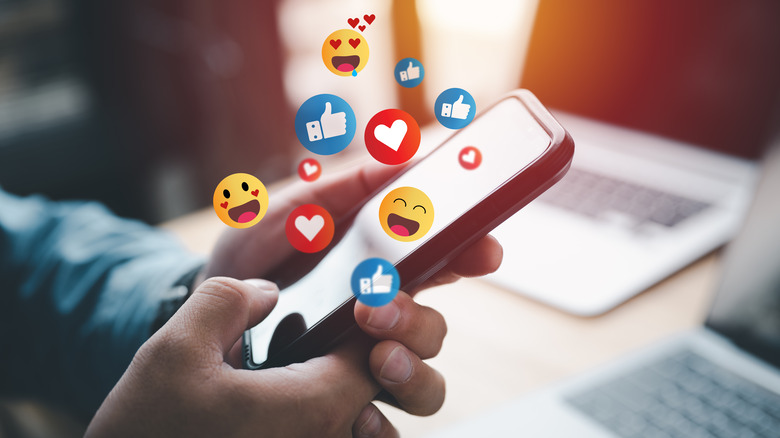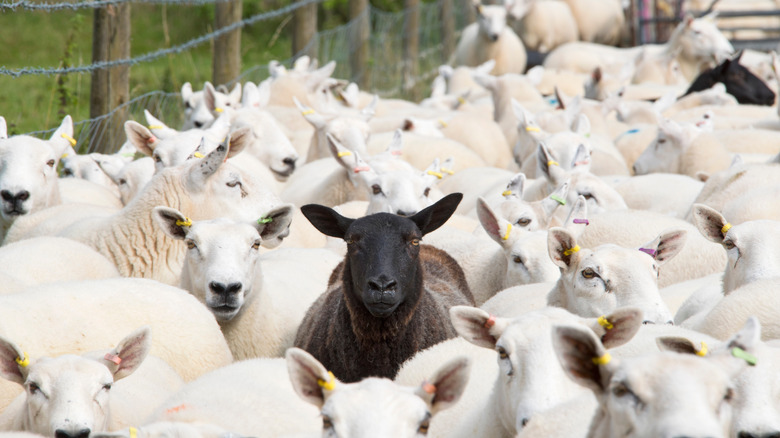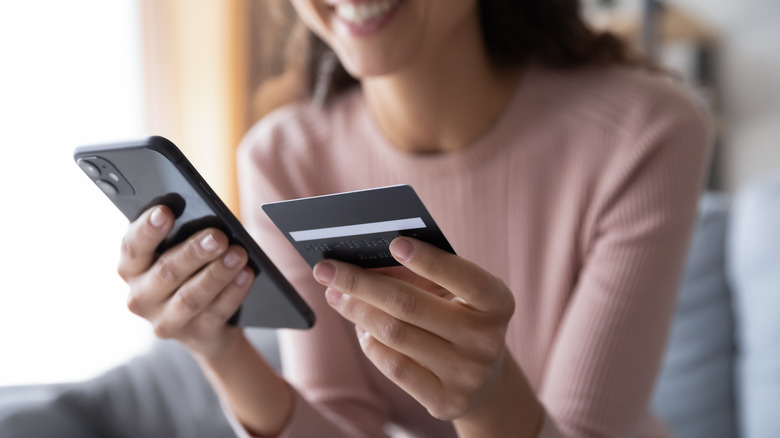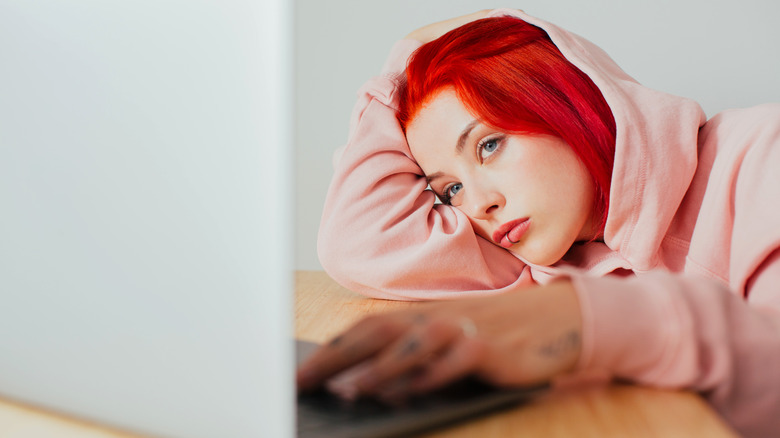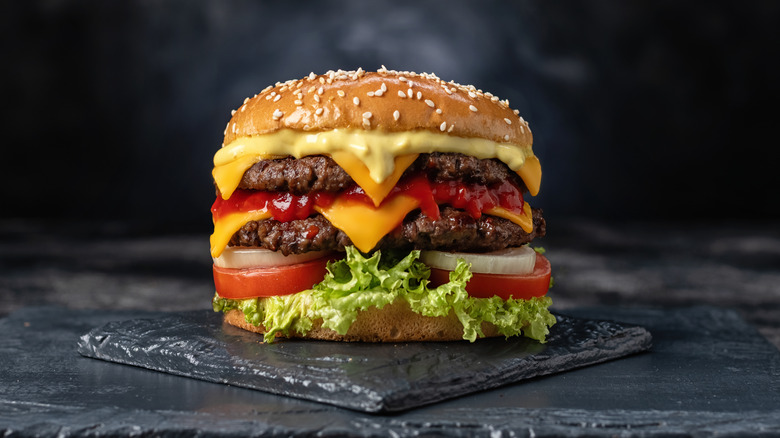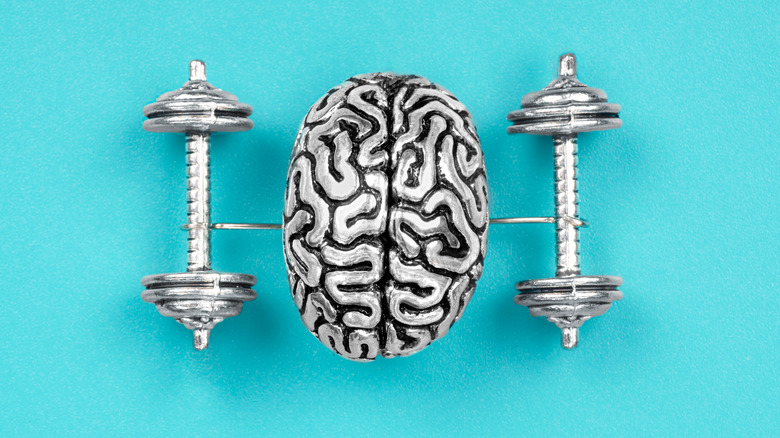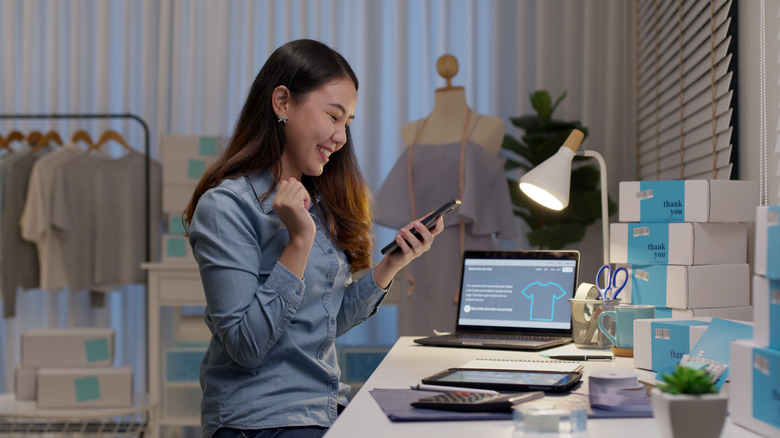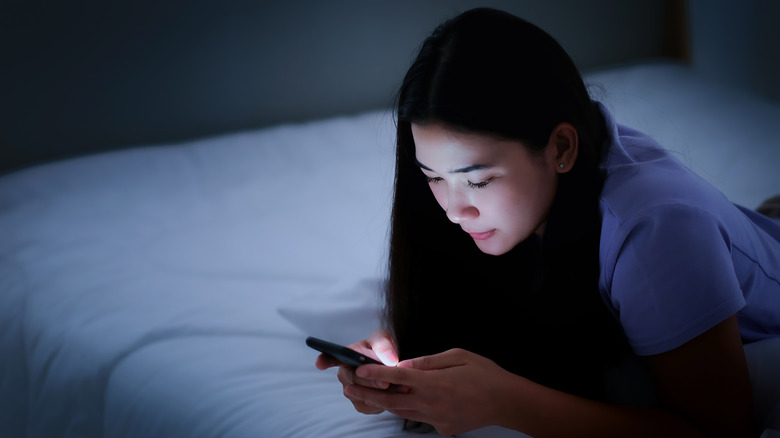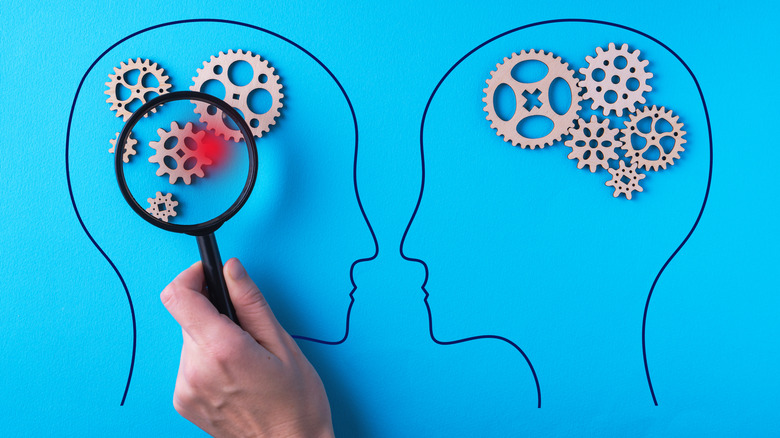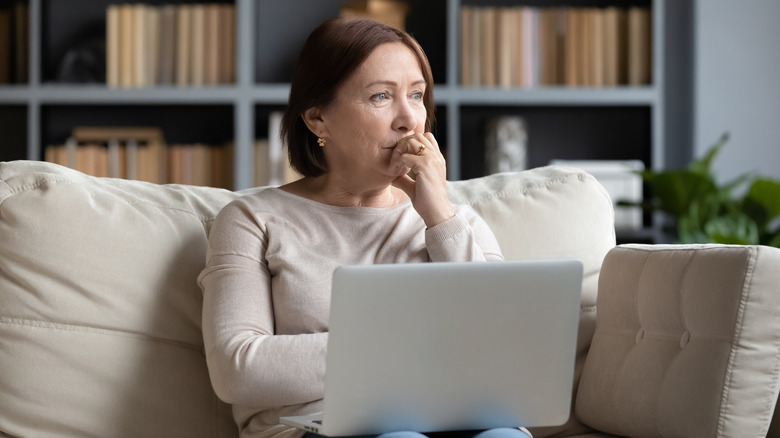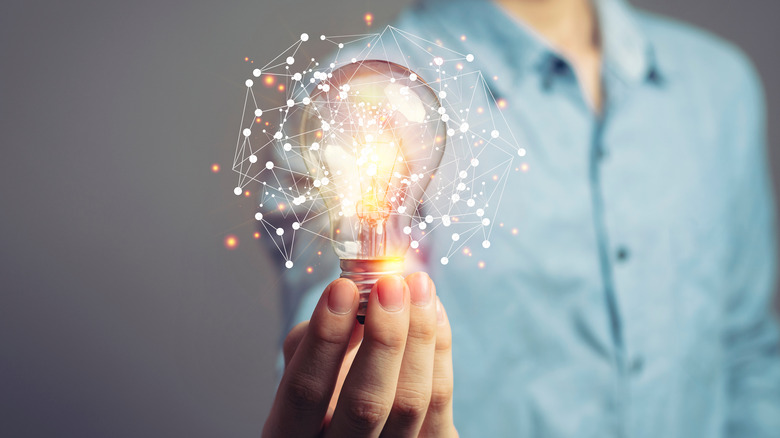When You Use Social Media, This Is What Happens To Your Brain
It is kind of crazy think back to the early aughts. Emo kids and Juicy Couture tracksuits were totally the things and social media was nary a figment of our collective imagination. Unless, of course, you count LiveJournal, where the aforementioned emo kids would post their poetry and whatever screamo song lyrics moved them for their two friends to read. Enter, Mark Zuckerburg and OMG, how things have changed.
Informally speaking, it seems like everyone is on social media in some form or another. Those who detest Facebook might be slaves to TikTok, and people who find value in Twitter may turn their noses at the mere mention of Snapchat. Don't even get us started on Instagram. Beyond the social and cultural implications of social media, these platforms and their designs are specifically created to deeply affect our brains and their functionality. The side effects of social media usage can range from benign to downright frightening, the latter category including things like the distortion of what matters and attention span-related concerns (per Human Tech). When you use social media, here are some of the most prominent occurrences in your brain.
You might lessen your ability to think independently
Oooof, inhibiting your ability to think independently is a banger of a side effect, and absolutely one that we should all be aware of. Existing within the confines of social media platforms is a typical way to be grouped with similarly-thinking people, which is especially true when it comes to political leanings (via The Healthy). Our innate desires to be liked can often persuade us, even unintentionally, to conform just enough to create homogeny within our groups.
This phenomenon, often called "groupthink," can begin to chip away at our ability to think independently. This can become dangerous in two ways. On the one hand, our desire to fit in can lead to us making subtle decisions without even being aware that our desires were not born of our own instincts. On the other hand, being a part of a staunchly like-minded group can lead to reckless decision-making if our choices come from this desire to fit in.
You may feel inspired to spend more money
You know how it seems like all of the random people you went to high school with are constantly flying to far-flung islands for vacation while wearing the cutest outfits possible? Yeah, us too. It can feel like we are missing out on everything while we stare at the walls of our apartments, trying to cobble together some extra cash to drop on a new pair of Lululemon leggings. Hence the convenient abreev created to explain this feeling: FOMO (you know, the fear of missing out).
It turns out that FOMO can fuel our desire to spend money, which is essentially a social media-fueled version of "keeping up with the Joneses." Charles Schwab issued a Modern Wealth survey in 2019 and found that nearly 50% of millennials surveyed cite social media use as a reason they overspend. A slightly older study published by the Journal of Consumer Research even found a link between heavy social media use and higher-than-average credit card debt. So while it is enticing to drop cash to create the right social media optics, spending more money in this fashion might not be beneficial for your financial health over the long term.
You may feel worse about yourself
While some of the side effects of social media use are insidious or even invisible, the effect that this type of social engagement has on our self-esteem is typically a noticeable one. As we all generally know, social media feeds are essentially a highlight reel of a person's life (via The Healthy). Think about your own posts for a moment — that last post where you congratulated yourself for finishing the 5k run you'd been training for includes you face at the finish line with a huge smile on your face. Behind the scenes, you may have just gone through a breakup, or might be paralyzed by fear that you're about to get fired.
Social media emphasizes the shiniest moments of the human experience while failing to acknowledge the more human ones. Even influencers who have built a platform based on their "realness" still operate with a keen eye for aesthetics, which can leave us feeling like we are not good enough. Social comparisons can diminish our self-esteem because it can ignite feelings of falling behind, not looking the right way, etc. This can spiral into feelings of depression, per the Journal of Social and Clinical Psychology. From body confidence and beyond, social media breaks can improve our own feelings of self-confidence.
You might end up eating more
As if feeling worse about ourselves and spending more money than we typically would aren't bad enough, it turns out that using social media can actually signal our brains to eat more too, ugh! You are probably familiar with the concept of "food porn," which is defined as "juicy, mouth-watering, high-res images of incredibly delicious looking food" by Urban Dictionary. Looking at images of food porn can provoke our brains to send the signal to eat, even if we are not truly hungry (via The Healthy).
These signals are often called "external hunger cues," meaning that they do not originate from the typical hunger-signal pathways — and researchers have found that people are susceptible to the power of these external hunger cues (via Brain and Cognition). Viewing lush images of decadent food can spark neurological and even physiological changes in how our bodies process hunger signals.
Your ability to engage in face-to-face conversations might change
Most of us have gotten caught up explaining something over text only to realize that the message we are trying to convey lacks the tone needed, leading the recipient of the message to scratch their head and misconstrue the message. We tend to think that this is the main downside of communicating digitally, but in reality, it is our face-to-face conversational skills that might suffer more (via The Healthy). We can form habits around quick responses and emojis, which can compromise our abilities to engage one-on-one.
This happens because emoji-driven responses degrade our capacities for expressing emotions. After all, it is way easier to send a frowning face to your boyfriend after he forgets to feed your cat than it is to explain how forgetting to feed the cat feels like a side effect of deeper emotional turmoil. While there is nothing inherently wrong about texting to stay in touch, experts remind us that face-to-face conversations, while more vulnerable, set the scene for better bonding and stronger emotional connections.
Social media use can lessen your ability to multitask
Using a smartphone truly feels like the pinnacle of multitasking. How many times have you been death-scrolling Instagram when a text from your friend pops up. You'll answer the text before popping over to your work email to check in when a notification for ScrabbleGO beckons you to just play one turn. On and on it goes, one notification pinging us from one direction while we bounce from task to task without ever truly completing a train of thought or function.
Unfortunately, multitasking on the reg is a great way to decrease your capacity to, well, multitask (via American Psychological Association). When we constantly shift our focus from one project to the next, each task suffers. Complex tasks, notably, should not be multitasked, as we end up wasting valuable seconds. When it comes to social media, our attention spans have dwindled to an average of eight seconds because of all of the bouncing around and multitasking we do (via Time).
The amount of grey matter in your brain can change
Do you remember the days when we all collected Facebook friends after every social gathering? I mean, who would even have considered dating someone with fewer than 500 Facebook friends in that era, ugh AS IF! It turns out that the size of your social media network is totally related to the structure of your brain. So in this case, yes, size does matter, especially as it relates to your, um, grey matter.
The grey matter in your brain is tasked with information processing, according to Simply Psychology. A 2018 study published in Social Neuroscience found that those who use Facebook more frequently tend to have more grey matter in their brains. In this study, they found a strong correlation between heavy Facebook use and one's ability to process information in a social capacity, essentially described as empathetic tendencies. However, as explained by The Healthy, this study did not determine whether the higher grey matter came first and inclined a person toward Facebook use, or if the Facebook use led to increased grey matter.
The way your brain experiences rewards can be affected
This is likely a social media side effect that you have heard of. Even if you have not become intimately involved with this effect, you are probably at least peripherally familiar with the idea that the number of likes we get can activate the reward center in our brains. This reward center, officially named the nucleus accumbens, is responsible for releasing dopamine hits when we experience something pleasurable. When reported by The Healthy, they liken this rewards reaction to the experience of eating chocolate.
However, this constant influx of dopamine can bring about some negative side effects. Namely, once we become accustomed to consistent reward center reactions, we may begin to rely on these dopamine hits to feel happy, which can lead to a self-perpetuating cycle. In this way, utilizing social media and watching the likes roll in can be similar to what drives gambling or shopping addictions.
The blue light from your devices can interfere with your circadian rhythm
There are quite a few different varieties of light waves, many of which we come into contact with on a daily basis. Our near-constant exposure to blue light is relatively new, though it has now been studied extensively (via Harvard Health). While our individual circadian rhythms vary, they are generally dictated by the cycling of the sun. Blue light exposure comes with a host of other side effects, but its main relationship to sleep comes in the way it influences our melatonin production.
Melatonin is a hormone that is naturally produced in our bodies, and it helps to regulate our sleep and wake cycles. Most forms of light can inhibit melatonin production, but blue light's ability to do so exists on a whole other level, or spectrum, if you will. Because blue light can be so detrimental to our melatonin production, and thus our sleep/wake cycles, scrolling through social media can influence the quality and quantity of the sleep we get.
Social media notifications trigger our salience networks
Social media notifications trigger our salience networks. And what, you might wonder, is a salience network? The term "salience network" basically describes the relationship between a bunch of very important brain structures (via Science Direct). The interdependency of all of these structures helps us identify what incoming stimuli is important. A lot of research is currently underway to help us more deeply understand the intricacies of the salience network and its functions. Specifically, researchers are studying the links between how the engagement of the salience network changes with differing social situations, especially during brain development.
On a basic level, adults and adolescents have differing salience network engagement, which becomes even more divergent based on external factors, such as social rejection. The type of feedback adolescents receive directly relates how which parts of the salience network are activated. As an example, Science Direct explains how in one study, adolescents who were given positive feedback from a peer who they didn't know ignited positive salience network reactions. They further state, "... adolescence may be a unique time of heightened sensitivity and salience of positive peer approval." While more research is needed to fully understand the complexity, it is clear that the social elements of social media can affect our salience network.
Social media can increase our feelings of social isolation
Social isolation is another often-discussed side effect of too much social media use. On the surface, it seems that many of us became well-acquainted with the isolating effects that solely engaging with people via a screen can bring about after being forced to do so amid the COVID-19 pandemic. Using social media regularly can increase feelings of loneliness, which seems like the opposite of what we would expect to happen (via NPR). After all, social platforms literally place the power to connect with millions of people at your fingertips.
One component that may lead to feelings of isolations is the heightened feelings of FOMO, made even more relevant when we spend upward of two hours scrolling through feeds that show us the social highlights of other people's lives. While much of the problem is still shrouded in mystery, one thing is clear — depriving yourself of face-to-face interactions and instead only engaging via social media is detrimental to overall wellbeing. Researchers are quick to say that increased feelings of isolation alone are not a reason to ditch social media all together, but they remind us to keep pursuing soul-fulfilling IRL interactions.
You might lose creativity
By now it should come as no surprise to you that the distractions caused by social media are oh-so real. This is especially true when it comes to our creativity, or lack thereof if we are heavy social media users, according to The Healthy. One of the keys to reigniting creativity is taking regular social media breaks. These breaks can be especially effective if you opt to point your focus on another task or project. In many ways, it seems that the notifications from social media may be the main contributing factor here.
Having social media as a constant distraction in the background can pull your attention away from whatever it is you are trying to create, which can inhibit your ability to truly get those fabled creative juices flowing. Taking a very long-term social media break is one way to bring some more creativity back into your mind and life.
Your capacity to feel bored changes
Your capacity to feel bored changes with social media use, though not in any type of helpful way. So many of us constantly have our phones on us and pull them out during short bouts of downtime to help combat our boredom. It turns out that this habit has some sneaky negative side effects (via The Healthy). One small study on college students even found that scrolling through social media for a casual 30 minutes can effectively increase feelings of boredom and the ability to cope with these feelings (via SAGE Open).
Furthermore, opting to scroll through your brightly colored, engaging social media feeds is essentially taking the easy way out when it comes to vanquishing boredom. As an example, The Healthy explains that in a world where social media isn't an option that we always have in our pockets, we would be more inclined to combat our boredom by doing an activity that engages our minds. They use reading and crosswords as examples of old-school ways that we used to occupy ourselves.
You may develop a lessened ability to understand yourself
Let's get super meta for a moment as we try to understand the ways in which social media use can influence the relationship between our mental and emotional selves. We have talked at length about the effects that social media use has on your brain, but how do these side effects trickle into our self-images and abilities to uncover who we truly are?
Most social media platforms are essentially incredibly superficial sounding boards that do not necessarily serve us as individuals (via The Healthy). Whether we admit it or not, the dopamine response we receive from collecting likes as feedback provides motivation to keep posting. By removing ourselves from social media, we tune out the proverbial noise and can focus on getting to know who we truly are outside of the feedback we receive from other people. On our journeys to self-discovery, letting go of caring what others thing is crucial.
